Crawl space smell like cat pee?
ar26pt2
3 years ago
Featured Answer
Sort by:Oldest
Comments (10)
ar26pt2
3 years agoRelated Discussions
Why do Amethyst Falls Wisteria flowers smell like cat urine
Comments (9)It took me 3 years to train mine into a 6-foot tree form and it died this winter. :( Oh well, but back on topic ... sometimes the flowers smelled really sweet and grape-like and sometimes they smelled like cat urine. Go figure. If I remember correctly, they smelled sweeter and more pleasant when they were young and began to smell poorly as they aged. This year I'm going to try again to form a Wisteria standard, but I'm using Wisteria macrostachya 'Blue Moon'. It's supposed to be more hardy, but like Amethyst Falls it's not crazy aggressive. Also, the flower panicles are longer (about 1 foot) and it supposed to repeat bloom at least 2-3 additional times through the season. Wish me luck!...See Morecat smell but no cat, should I be concerned?
Comments (2)While I can understand your concern--no one wants to live across the hall from a meth lab--just the smell of cat pee would not be enough for me to notify the authorities. It's possible that someone in the building has a cat that they let out into the hallway. (Why they would do that, I have no idea, but it's possible.) I found this list of warning signs of a meth lab: â¢Unusual, strong odors (like cat urine, ether, ammonia, acetone, or other chemicals). â¢Residences with windows blacked out. â¢Renters who pay their landlords in cash. â¢Excessive traffic in and out of the residence at un usual times. â¢Excessive trash including large amounts of items such as antifreeze containers, lantern fuel cans, stained coffee filters, drain cleaner, and duct tape. â¢Unusually large amounts of clean glass containers being brought into the house. â¢Secretive/protective area surrounding the residence (video cameras, alarm system, guard dogs, reinforced doors, electric fencing). â¢Persons exiting the residence to smoke. â¢Little or no mail, furniture, and no newspaper delivery. I'd say if you saw three or more of those warning signs, I'd call the police and tell them what you suspect. Let the police deal with the matter from there. Be careful with the smoking outside one, though. A lot of people I know who smoke only smoke outdoors, as they don't want their homes smelling of smoke. But if you have the cat pee smell and you can't locate a cat, and the guy smokes outsdoors and all his windows are blacked out and there are a lot of late-night visitors, then I think you should call the cops. And you can always just call the landlord and tell them the hall smells and could they come out and clean it?...See MoreMy house smells like cat pee!
Comments (9)My sister-in-law bought a house with hardwood floors that had had a serious "cat problem." They had the floors sanded and refinished and the smell is gone. It isn't cheap, but it is a lot cheaper than replacing the floors. I've had limited success with a spot treating product called Nature's Miracle. I've used it on carpet and it definitely reduces the odor better than other things, but doesn't totally remove it. I've never tried it on wood. As for finding pee spots, a fluorescent blacklight in a dark room will make old urine stains glow yellowish white. You used to be able to get blacklights at places like Spencer's Gifts, but I think some online pet stores have them now for exactly this purpose. Works especially well on carpet (although it's creepy to see all the old stains), but it may work on your wood too. You may be surprised how many there are....See Morecat pee in crawl space is stinking up the house
Comments (9)Having dealt with cat pee I know it's REALLY annoying and very difficult to get rid of 100%. Natures Miracle is ok, but I have found that the Natures Miracle specifically for cats is even better. Another option you might try is something called Sweet PDZ. It's used in horse stalls to keep the horse pee smell down. I use it in my back yard to keep the smell of dog pee away. I can buy a 25lb bag of it for $8 or so. It's supposed to work well on cat pee too. Here is a link that might be useful: Sweet PDZ...See MoreHU-604386267
3 years agoar26pt2
3 years agoHU-775121242
2 years agoUser
2 years agohollyburnett
2 years agoBalin B
last yearlast modified: last yearEj C
last yearBalin B
26 days agolast modified: 26 days ago
Related Stories
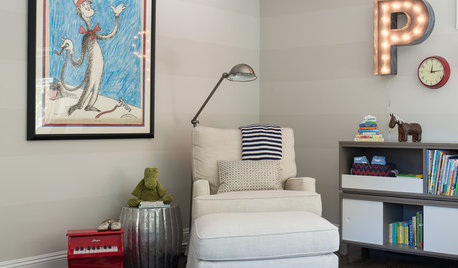
NURSERY IDEASRoom of the Day: The Cat in the Hat Inspires a Nursery Color Palette
Avoiding babyish themes, a newborn boy's stylish room is designed to grow up with him
Full Story
BATHROOM DESIGNDream Spaces: 14 Fabulous Indoor-Outdoor Bathrooms
Disappearing walls put these baths in Mother Nature’s lap, counting tranquil views and fresh air as the best luxuries of all
Full Story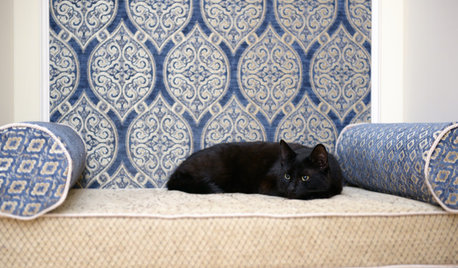
PETS10 Tips for Keeping Indoor Cats Healthy and Happy
It's National Cat Day: Ask not what your cat can do for you (because it will ignore you) but what you can do for your cat
Full Story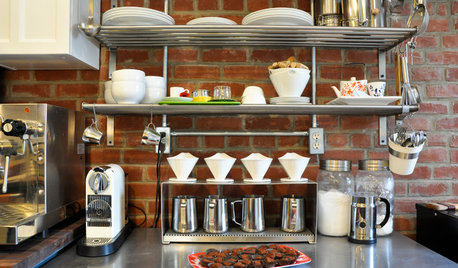
KITCHEN DESIGNSimple Pleasures: Wake Up and Smell the Coffee
Slugging down any old sludge while pulling on socks is no way to start the day. Learn to brew amazing java and savor the experience here
Full Story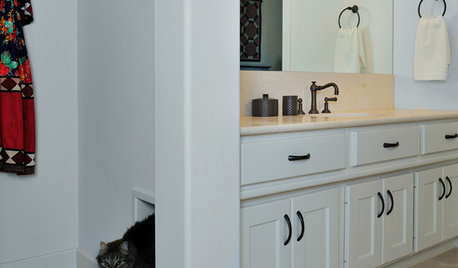
PETSSo You Want to Get a Cat
If you're a cat lover, the joys outweigh any other issue. If you haven't lived with one yet, here are a few things to know
Full Story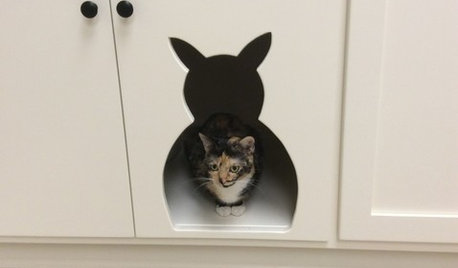
PETSReaders Share Options Galore for Cat Litter Boxes
Houzzers recommend their cat box solutions and customized hacks
Full Story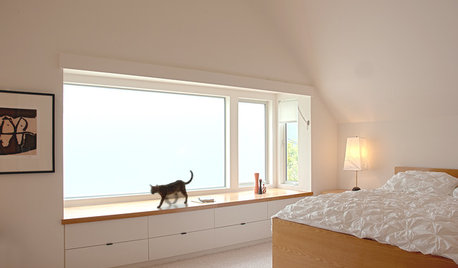
FUN HOUZZHouzz Pets: 50 Cats Cozy Up at Home
Design-Loving Felines Have the Run of the House
Full Story
HOMES AROUND THE WORLDWorld of Design: 11 Book Lovers and Where They Like to Read
Bibliophiles across the globe reveal their top books and favorite reading spots, from a 2-story library to an artfully curated book nook
Full Story
DECORATING GUIDESHow to Choose an Awesome Area Rug No Matter What Your Space
High use, a low door, kids and pets running amok — whatever your area endures, this insight will help you find the right rug for it
Full Story
DECORATING GUIDES12 Design Tips From Guy-Friendly Spaces
Man up with these ideas from dudes who've navigated the decorating process with style and gusto
Full Story


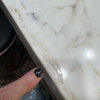


worthy